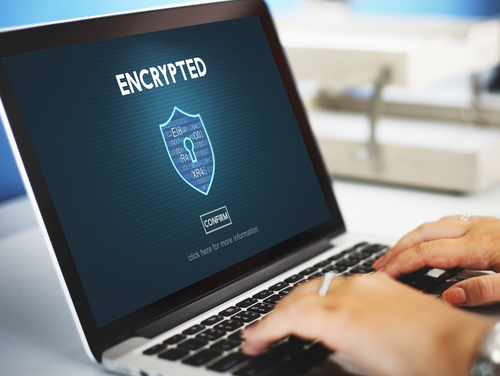VPNs are a great way to improve your security online, but if you’re looking for a VPN that works well on mobile devices, you may want to use a VPN server with IKEv2/IPSec protocols. IKEv2 is the fastest VPN protocol currently available.
Its speed and ability to auto-reconnect make it a sought-after key exchange protocol for mobile devices and smartphones. Learn more about how IKEv2 works and how it may improve your VPN experience.

What is a VPN protocol?
A Virtual Private Network (VPN) is a way to disguise your identity and activity online. Your device connects to a VPN server. This server creates an encrypted tunnel and routes your internet traffic through the VPN server, obscuring your IP Address.
People use VPNs to protect themselves from companies and hackers tracking them online. They also use VPNs to keep themselves safe on public Wi-Fi, bypass geographic restrictions, hide their IP address while gaming online, navigate to blocked sites on work or school networks, and hide their IP address while using certain software.
VPN protocols are rules that dictate how data gets transmitted and encrypted between a VPN server and your device. There are several different types of VPN protocols. The most common protocols include OpenVPN, L2TP, WireGuard, IPSec, and IKEv2. Here is an overview of these common VPN protocols:
- OpenVPN: This is the most commonly used VPN protocol. It is open-source and uses SSL/TLS key exchange. It supports UDP and TCP. It is compatible with most operating systems and provides reliability, security, and convenience.
- WireGuard: This newer protocol is faster and has better performance than many other protocols. It is also open-source and operates over UDP. It is compatible with most operating systems and is being rapidly adopted by many VPN providers.
- L2TP: This protocol is often paired with IPSec. It is slower than many other protocols, but it is supported by a large number of operating systems.
- IPSec: This protocol is often used on mobile devices and provides robust security. It pairs well with other VPN protocols to create a more secure connection.
There are many other types of VPN protocols on the market, each with its advantages and disadvantages.
What is IKEv2?
Internet Key Exchange version 2 (IKEv2) is one of the fastest VPN tunneling protocols. This Diffie-Hellman key exchange algorithm was developed by Microsoft and Cisco. The protocol is always paired with IPSec, an encryption layer, so sometimes people refer to the protocol as IKEv2/IPSec.
IKEv2 is a newer protocol that replaces IKEv1. It is well-suited for mobile devices and has high speeds that do not compromise security. This protocol supports configurations such as AES, Blowfish, ChaCha 20, and Camellia.
It also supports 256-bit encryption and Multihoming protocol that provides some of the best encryption algorithms available. These improve the security and reliability of the connection. This VPN protocol integrates well with open-source software and uses X.509 certificates for authentication.
It also uses UDP Port 500 and supports Perfect Forward Secrecy (PFS) for data integrity.
Why Are IKEv2 and IPSec Paired?
Internet Protocol Security (IPSec) is a secure and reliable suite of protocols that VPNs use to make an internet connection.
VPNs often use IPSec to create their encrypted tunnels. IPSec provides data origin authentication, provides data confidentiality, manages key exchanges, and reduces the size of the IP packets to improve communication levels on congested links.
IKEv2 is a protocol that reconnects quickly to switch networks and keeps the connection stable during drops. Together, they provide a great combination of reliability and speed. IKEv2 is not a secure protocol on its own. It needs IPSec to provide the encryption that makes it a secure VPN option.
How Does IKEv2 Work?
IKEv2 creates a security association (SA) between the VPN client and the VPN server. The protocol works to make sure your device and the VPN server use the same encryption keys and algorithms.
It has to negotiate what kind of security the two will use to create the connection. The protocol completes message pairing with a new, simpler message flow to make key exchange negotiations easier and quicker.
Then, IKEv2 validates the SA and generates the encryption keys used to encrypt and decrypt the data. Next, IPSec creates a secure encryption tunnel to allow communication between your device and the secure server.
Your data transfers between your device and the server, successfully keeping your data secure all along the way.
Is IKEv2 Secure?
IKEv2 has many security features that make it a good choice. It supports several different algorithms such as Blowfish, Camellia, and AES 256-bit. It also has a certificate-based authentication. It won’t act unless it verifies the identity of the requestor.
This helps to prevent man-in-the-middle attacks. If you transition from IKEv2 VPN to your local WiFi, the transitions are seamless, leaving no gaps that might lead to data leaks. This is one of its best features and it makes this idea for mobile use, since switching between networks is something that mobile devices do often.
These security features make it a good choice to keep your data safe from hackers.
Is IKEv2 Compatible With Many Devices?
IKEv2 is the recommended protocol for mobile devices. It is native to macOS and iOS devices, so it is slightly faster on these devices. It works with Windows, Android, Linux, and many routers. This protocol also works with Smart TVs and some streaming devices.
Many VPN service providers who offer IKEv2 will have routers they want you to use to implement the protocol. Since IKEv2 is not open-source, it is not free to download and install on your existing router without a subscription.
Is IKEv2 Open Source?
One thing to consider, however, is that this protocol is not open-source, which means that the algorithm has not been peer-reviewed and is not free to use. Closed source protocols can be more expensive and restrictive because they are controlled by a company.
They will not be available for free like open-sourced protocols. They also don’t go through as many audits as open-sourced protocols do. However, many people do not trust open-source software. Open-source software can be risky.
When anyone in the world can see your code, it makes it easier for hackers to take advantage of that knowledge to exploit the code. Additionally, open-source software can be modified, edited, and upgraded by users freely.
This can be helpful if the modification improves the code, but it can also ruin the code’s functioning if it is modified incorrectly. Open source material is also often harder to implement because there is no technical support, so you would have to figure out any problems with the software and work on it on your own.
So, even though IKEv2 isn’t open-source that doesn’t mean that’s bad. It may mean that it offers more security than some open-source protocols.

Is IKEv2 Good For Gaming?
If you do a lot of gaming on your smartphone, IKEv2/IPSec is a great protocol to use. It ensures that your connection is unaffected even if you switch from WiFi to VPN to Mobile Data. It is a really fast protocol, as well, which makes games run smoother.
IKEv2 also efficiently uses a device’s resources, which is why it works so well for mobile devices. It is gentler on weaker devices so that it doesn’t overload them. This protocol is also compatible with many different platforms and operating systems.
It works on computers, mobile devices, and routers, so you can take your gaming anywhere.
What Are Some Downsides to Using IKEv2?
The biggest issue with switching to the IKEv2/IPSec protocol is that it is hard to find open-source routers that support it. Microsoft and Cisco developed this protocol in-house and didn’t subject the code to peer review, so there may be unknown flaws that hackers could exploit.
Also, since IKEv2 uses UDP Port 500, it may trigger a firewall that prevents the VPN from operating. Network administrators at your work or school could also easily block VPNs using this protocol, so it may not be a good choice for getting around blocked sites on organization networks.
The protocol is also vulnerable to weak passwords. IKEv2 compares the password entered to the stored hash value. If your password is simpler, it may be easier for hackers to crack it.
IKEv2 vs Open VPN
Both OpenVPN and IKEv2 are protocols used by several VPN providers. They are both secure encryption algorithms that use 256-bit encryption. IKEv2 is faster than OpenVPN, though. In speed tests, IKEv2/IPSec servers had a ping rate of 92 ms versus OpenVPN’s 84 ms. As for download speeds, IKEv2/IPSec registered at 141.94 Mbps.
Open VPNs had download speeds of 5.64 Mbps. Finally, the upload speeds were 6.34 Mbps for IKEv2/IPsec vs. 35.84 Mbps for OpenVPN. IKEv2 also uses auto-reconnect to improve the connection stability to make sure there are no gaps between protection when the network is lost.
Although both protocols are very secure, IKEv2 provides more speed and reliability than OpenVPN. Many mainstream VPN service providers use OpenVPN due to its long-standing reputation for quality and security.
On the other hand, OpenVPN uses TCP port 443 which is not as easy to block by admins as UDP Port 500. OpenVPN is also an open-source protocol that many devices, VPN providers, and routers support.
IKEv2 vs. L2TP/IPSec
Another protocol often paired with IPSec is the Layer 2 Tunneling Protocol (L2TP). This VPN network extension only uses encryption for its own control messages and does not encrypt content itself.
However, when it is paired with IPSec, it becomes more secure, as IPSec provides the encrypted tunnel. Yet, Edward Snowden, the former NSA contractor, revealed that this protocol was compromised by intelligence services.
So, this may not be the most secure protocol on the market. L2TP takes more time to transfer information and generate security credentials through the VPN tunnel. NAT firewalls block L2TP protocols more easily than they do IKEv2, as well.
So, between the two, IKEv2 works better, however, L2TP is more compatible with a variety of systems. Thus, it may be better for compatibility concerns.
IKEv2 vs. WireGuard
WireGuard is a modern VPN protocol widely adopted by VPN providers. It is open-sourced and performs well during security audits. It also only has 4,000 lines of code, so it is straightforward and compact.
It integrates well with the top cryptograms like ChaCha20, Poly1304, and HKDF. Both WireGuard and IKEv2 have comparable speeds, but WireGuard is slightly faster. They are both also widely available on Linux, Windows, macOS, iOS, and Android devices.
WireGuard is often the preferred protocol for many of the top VPN providers because it is open-source, but IKEv2 is gaining more popularity for its excellent mobile device connectivity. Big-name VPN companies like NordVPN use WireGuard as part of their protocol.
Sekur VPN
If you like the idea of a proprietary technology that isn’t open source, then Sekur VPN is a great option for keeping your IP address anonymous online. We have high-speed Swiss servers with unlimited data that provide different layers of encryption to protect your data.
Our VPN is easy to use and set up. All you need to do is download and tap. A single license works on all your devices to help you navigate securely. Our proprietary technology transfers all data using a multi-layered 2048-bit encrypted tunnel that keeps all communications on our Swiss servers.
We also offer solutions for more private email and instant messaging. With Sekur, you are free from big tech hosting and you don’t have to worry about data mining. We are a 100% private platform.
Conclusion
IKEv2/IPSec encryption protocols are a newer, faster way to connect to VPN servers. The secure connection balances the best of both worlds: speed and privacy. If you are looking to improve your VPN speeds, consider using a VPN that uses IKEv2 protocols.
However, if you are having difficulties finding a router that will support IKEv2, OpenVPN protocols are still one of the top protocols for online security and reliable connectivity.

